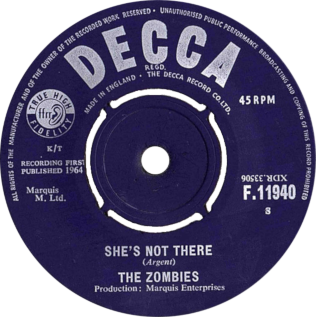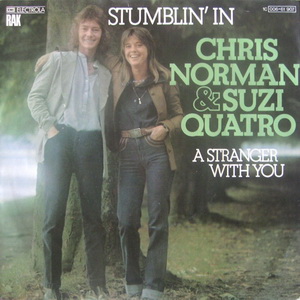
"Reflections" is a 1967 song recorded by The Supremes for the Motown label. It was the first Supremes record credited to "Diana Ross and the Supremes", and among their last hit singles to be written and produced by Holland–Dozier–Holland (H–D–H), Motown's main production team.

"You Keep Me Hangin' On" is a song written and composed by Holland–Dozier–Holland. It was first recorded in 1966 by American Motown group the Supremes, reaching number one on the Billboard Hot 100. American rock band Vanilla Fudge released a cover version in June the following year, which reached number six on the Billboard Hot 100. English singer Kim Wilde covered "You Keep Me Hangin' On" in 1986, reaching number one on the Billboard Hot 100 in June 1987. In the first 32 years of the Billboard Hot 100 rock era, "You Keep Me Hangin' On" became one of the six songs to reach number one by two different musical acts. In 1996, American country singer Reba McEntire's version reached number two on the US Billboard Hot Dance Club Play chart. The BBC ranked the Supremes' original song at number 78 on The Top 100 Digital Motown Chart, which ranks Motown releases by their all-time UK downloads and streams.

"I'm a Believer" is a song written by Neil Diamond and recorded by American band the Monkees in 1966 with the lead vocals by Micky Dolenz. The single, produced by Jeff Barry, hit the number-one spot on the U.S. Billboard Hot 100 chart for the week ending December 31, 1966, and remained there for seven weeks, becoming the last number-one hit of 1966 and the biggest-selling single for all of 1967. Billboard ranked the record as the number-five song for 1967. While originally published by Screen Gems-Columbia Music (BMI), it is now published by Stonebridge Music/EMI Foray Music (SESAC), with administration passed to Sony Music Publishing and Universal Music Publishing Group.

"Angel of the Morning" is a popular song written by Chip Taylor, originally recorded by Evie Sands but which first charted with a version by Merrilee Rush. The song has been covered by many artists including Chrissie Hynde, Dusty Springfield P. P. Arnold, Connie Eaton, Mary Mason, Guys 'n' Dolls, Melba Montgomery, Olivia Newton-John and most recognizably by Juice Newton.

"(They Long to Be) Close to You" is a song written by Burt Bacharach and Hal David. The best-known version is that recorded by American duo The Carpenters for their second studio album Close to You (1970) and produced by Jack Daugherty. Released on May 14, 1970, the single topped both the US Billboard Hot 100 and Adult Contemporary charts. It also reached the top of the Canadian and Australian charts and peaked at number six on the charts of both the UK and Ireland. The record was certified gold by the Recording Industry Association of America (RIAA) in August 1970.

"You Got It" is a song from American singer Roy Orbison's 22nd studio album, Mystery Girl (1989). The song was released posthumously on January 3, 1989, after Orbison's death from a heart attack on December 6, 1988. The song was issued with "The Only One" as the B-side and was later released with "Crying". The single reached number nine on the US Billboard Hot 100 and number one on the Adult Contemporary chart, returning Orbison to the top 10 for the first time in 25 years. "You Got It" also reached number three on the UK Singles Chart and entered the top five in 10 other countries. Although it is an Orbison solo single, Orbison's fellow Traveling Wilburys bandmates Tom Petty and Jeff Lynne co-wrote the song and played instruments on the record.

"Since I Don't Have You" is a song written and composed by Jackie Taylor, James Beaumont, Janet Vogel, Joseph Rock, Joe Verscharen, Lennie Martin, and Wally Lester. It was first a 1958 hit single for the doo-wop group the Skyliners on the Billboard Hot 100. Country music singer Ronnie Milsap had a hit with the song in 1991. American hard rock band Guns N' Roses also had some success in 1994 with their version of the song which reached the top 10 on the UK Singles Chart.

"She's Not There" is the debut single by British rock band the Zombies, written by keyboardist Rod Argent. It reached No. 12 in the UK Singles Chart in September 1964, and No. 2 on the Billboard Hot 100 in the United States at the beginning of December 1964. In Canada, it reached No. 2.

"Border Song" is a song by Elton John with music by John and lyrics by Bernie Taupin. The song initially appeared on the 1970 album Elton John, and was released in the spring of 1970 as the LP's first single. After failing to chart in the UK, it was released in North America a few months later. It met with more success there, especially in Canada, where it peaked at No. 34. The appearance of "Border Song" on the Canadian charts was John's first chart appearance in any country.

"Babe" is a song by the American rock band Styx. It was the lead single from the band's 1979 triple-platinum album Cornerstone. The song was Styx's first, and only, US number-one single, spending two weeks at No. 1 in December 1979, serving as the penultimate number-one single of the 1970s. "Babe" also went to No. 9 on the Adult Contemporary chart. It additionally held the number-one spot for six weeks on the Canadian RPM national singles chart, charting in December 1979 and becoming the opening chart-topper of the 1980s. It was also the band's only UK Top 40 hit, peaking at No. 6. It also reached No. 1 in South Africa.

"Hurts So Good" is a song by American singer-songwriter John Mellencamp, then performing under the stage name "John Cougar". The song was a number two hit on the Billboard Hot 100 for the singer/songwriter. It was the first of three major hit singles from his 1982 album American Fool. The others were "Jack & Diane" and "Hand to Hold On To," which were all released in 1982. The song was also a critical success with Mellencamp, winning the Best Rock Vocal Performance, Male at the 25th Grammy Awards on February 23, 1983.

"San Francisco (Be Sure to Wear Flowers in Your Hair)" is an American pop music song, written by John Phillips, and sung by Scott McKenzie. It was produced and released in May 1967 by Phillips and Lou Adler, who used it to promote their Monterey International Pop Music Festival held in June of that year.

"Soul Man" is a 1967 song written and composed by Isaac Hayes and David Porter, first successful as a number 2 hit single by Atlantic Records soul duo Sam & Dave, which consisted of Samuel "Sam" Moore and David "Dave" Prater. In 2019, "Soul Man" was selected for preservation in the National Recording Registry as "culturally, historically, and aesthetically significant" by the Library of Congress. It was No. 463 in "Top 500 Greatest Songs of All Time" by Rolling Stone Magazine in 2010 and No. 458 in 2004.

"Right Down the Line" is a song written and recorded by Scottish singer-songwriter Gerry Rafferty. Released as a single in July 1978, it reached #12 on the U.S. Billboard Hot 100 and #8 on Cash Box. It was the third release from Rafferty's City to City LP as the follow-up to his first major hit as a solo artist, "Baker Street".

"Georgy Girl" is a song by the Australian pop/folk music group The Seekers. It was used as the title song for the 1966 film of the same title. Tom Springfield, who had written "I'll Never Find Another You", composed the music and Jim Dale supplied the lyrics. The song is heard at both the beginning and end of the film, with markedly different lyrics. It was nominated for an Academy Award for Best Original Song but the prize went to "Born Free".

"Rock On" is a song written by English singer David Essex. Recorded in 1973 and released as a single by Essex, it became an international hit. In 1989, American actor and singer Michael Damian recorded a cover version that went to number one on the Billboard Hot 100 chart. The song has been recorded many times, including a 2006 version by the English hard rock group Def Leppard.

"How 'Bout Us" is the most successful single released by R&B music group Champaign. Composed by band keyboardist Dana Walden and originally released on the band's debut album How 'Bout Us, the title track peaked at number 12 on the Billboard Hot 100. A romantic ballad, the song was released on Valentine's Day, 1981.

"Stumblin' In" is a song written by Mike Chapman and Nicky Chinn, performed by Chris Norman and Suzi Quatro. Originally released as a standalone single, it was later added to some editions of the Quatro album If You Knew Suzi... It was Norman's first single as a solo artist.

"How Sweet It Is (To Be Loved by You)" is a song recorded by American soul singer Marvin Gaye from his fifth studio album of the same name (1965). It was written in 1964 by the Motown songwriting team of Holland–Dozier–Holland, and produced by Brian Holland and Lamont Dozier. The song title was inspired by one of the actor and comedian Jackie Gleason's signature phrases, "How Sweet It Is!"

"Breakdown Dead Ahead" is a 1980 song recorded by Boz Scaggs, and composed by Scaggs and David Foster. It was the lead single of two released from Scaggs's album Middle Man.




















